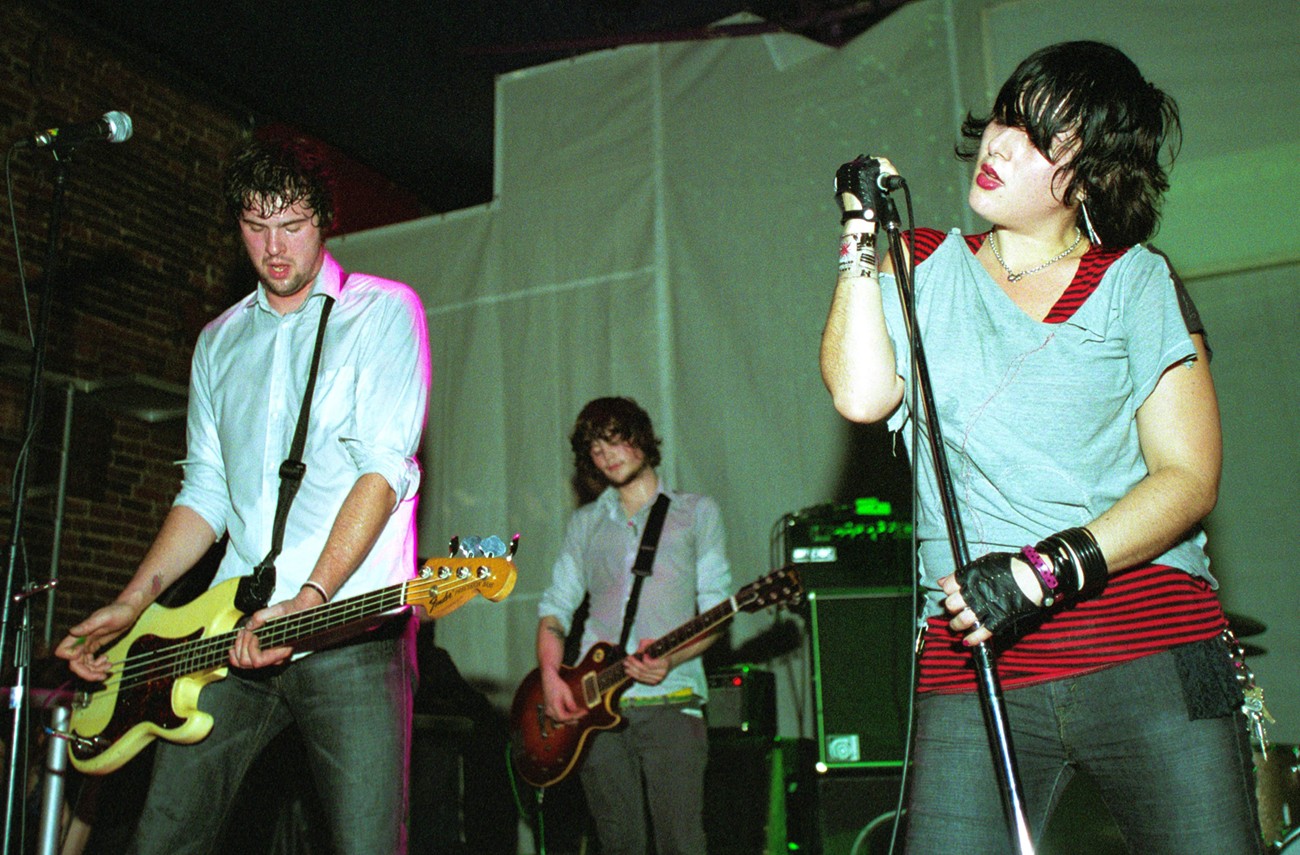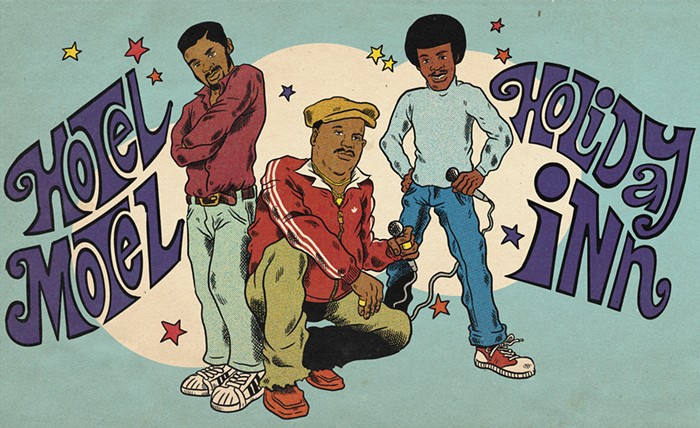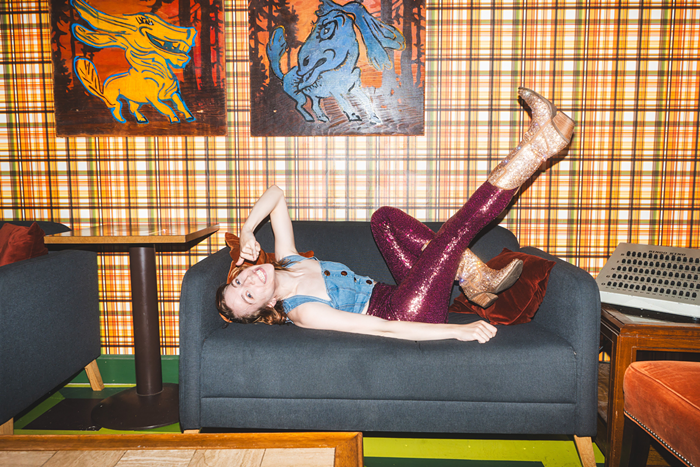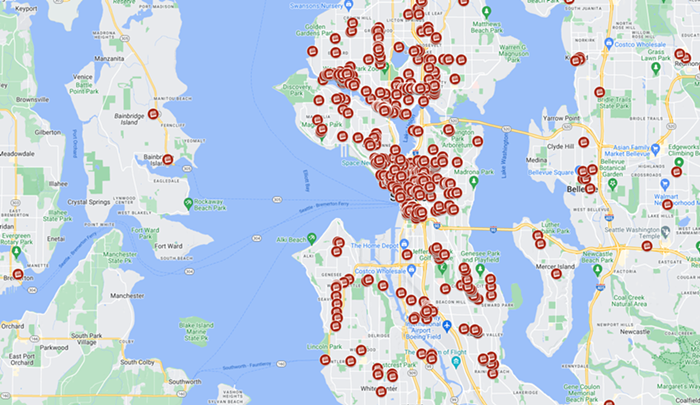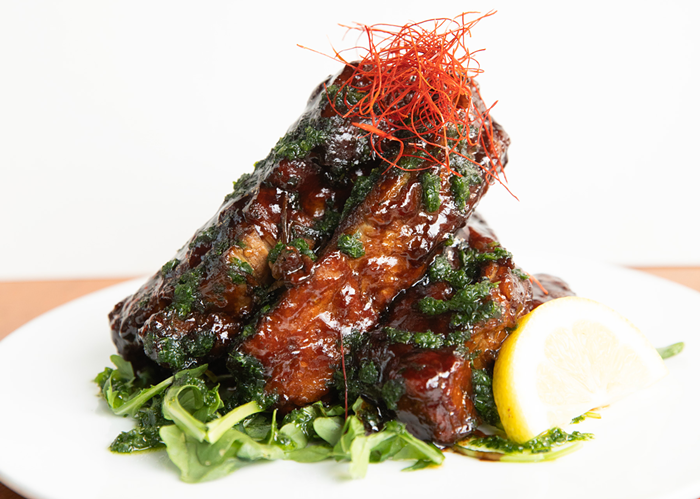Pretty Girls Make Graves came together in 2001 like a Frankenstein’s monster built from pieces of some of the Pacific Northwest’s most influential experimental hardcore bands, including Area 51, Death Wish Kids, Killsadie, Sharks Keep Moving, and the Murder City Devils.
Their critically acclaimed debut full-length, Good Health, was a conglomeration of those past lives. Opening track “Speakers Push the Air” is a high-octane, confident celebration of the power of music à la Operation Ivy’s “Sound System.” On tracks like “More Sweet Soul,” “Sad Girls Por Vida,” and “By the Throat,” the band leans into their heavier tendencies. Wiry, sharp guitars pierce through throbbing bass and incisive drumming while Andrea Zollo’s sing-scream vocals tear through the speakers to shout down any motherfucker who dared cross her.
Though Good Health was celebrated by fans and critics, the band slipped out from under any attempt to get pinned down on their follow-ups, The New Romance (2003) and Élan Vital (2006). Did you think they were early-aughts emo? Surprise—now they’re playing ghostly post-rock that burns slower than the nag champa incense you bought at Hot Topic. All the while, their live shows became a thing of legend, simultaneously chaotic and captivating affairs that often devolved into pits—nay, entire rooms of moshing, dancing, singing, and screaming.
In 2007, less than a year after the release of Élan Vital, the band broke up. Drummer Nick Dewitt announced he was leaving, and Pretty Girls Make Graves packed it in after one last tour that summer.
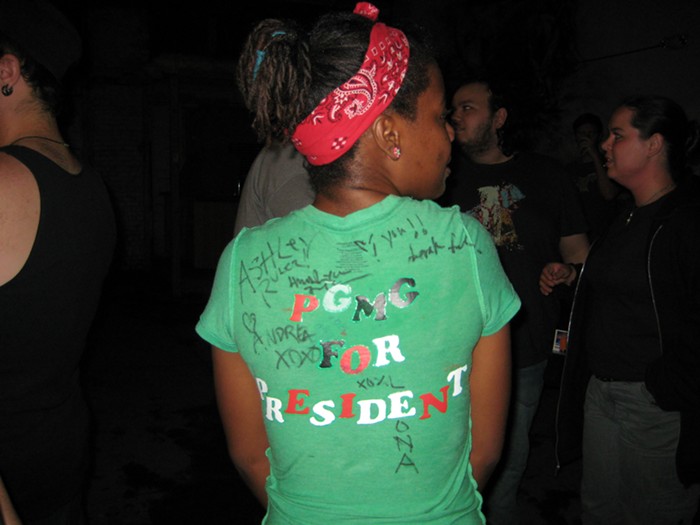
But Pretty Girls’ legacy has flourished, thanks to Spotify playlists, music blogs’ nostalgia-driven best-of lists, and fans’ wishful thinking. Stereogum’s Tom Breihan revisited Good Health 20 years after its release: “On Good Health, tension and release are one and the same,” he wrote. “The album burns itself out in 28 delirious minutes, and it’s enough to leave you breathless and stirred.” Brooklyn Vegan listed Good Health as one of the “Best Emo & Post-Hardcore Albums of 2002,” and The New Romance earned a spot on Pitchfork’s “The 50 Best Indie Rock Albums of the Pacific Northwest.” (How modern music criticism has devolved into niche lists recycling decades-old records is a story for another time.)
Even so, as Pretty Girls’ peers gave in to fans’ cravings for nostalgia—Jawbreaker, Blur, Le Tigre, and Botch have all returned to the stage—it felt like Pretty Girls Make Graves fans were resigned to be forever disappointed. Heartbroken. Emo. In response to someone asking, “What is the saddest truth about life?” renowned culture critic Hanif Abduraquib Tweeted in October 2023, “after 16 years I have finally come to accept the reality that pretty girls make graves are never reuniting.”
after 16 years I have finally come to accept the reality that pretty girls make graves are never reuniting https://t.co/TlmJ78gKZF
— Hanif Abdurraqib (@NifMuhammad) October 3, 2023
For me, it started feeling personal, too. It’s been a running joke in my circle of friends that I would gleefully jump in front of a moving car (like, a Prius, nothing crazy) if it’d result in PGMG pulling a Make-a-Wish and reuniting to help raise funds for my hospital bills.
Then it happened. Last November, the band announced they’d be reuniting to play The New Romance in full at the When We Were Young Fest in Las Vegas in October 2024. They’ve since confirmed more dates in New York, Los Angeles, and Portland, but, rightfully, Seattle gets them first. Pretty Girls Make Graves will play their first shows in 17 years on September 20 and 21 at the Showbox.
To mark what feels like nothing short of a miracle, I interviewed all the current members of the band (minus bassist Derek Fudesco, who doesn’t do interviews), as well as some of their colleagues, friends, and fans. To piece together their story for a new audience, yes, but also to try to make sense of their magic.
It’s the most appropriate way I could think to commemorate the return of a band whose music has seeped through my skin and into the marrow of my bones. The first 17 seconds of “Speakers Push the Air” are woven into my DNA. I almost can’t believe this is real.
Pretty Girls Make Graves are back. Pretty Girls Make Graves por vida. And I didn’t even have to run into traffic.
It Started in Our Basement
Actually, it started in a punk house. Before Pretty Girls Make Graves, all the bandmates—originally Andrea Zollo (vocals), Derek Fudesco (bass), J. Clark (guitar), Nathan Thelen (guitar), and Nick Dewitt (drums)—were teens in various experimental hardcore and rock bands.
It was the ’90s in Seattle, and because of a very active Teen Dance Ordinance, all-ages shows were hard to come by, so they played where they could—basements, garages, old theaters run by volunteers. These earlier projects were the playgrounds on which Pretty Girls found their voices and encouraged one another to explore the deepest, weirdest nooks of their creativity… which, apparently, sometimes included ankle-biting.
SPENCER MOODY (Area 51, Murder City Devils): When we started Area 51, we were like, “We’re starting a punk band. A punk punk band.” We were consciously trying to do something between Born Against and Filth. We were all from the Eastside, so me and Dann [Gallucci] and Andrea all knew each other from probably around the age 15 or 16. When Dann and Andrea met, Dann was afraid of Andrea. Andrea was like a Rizzo kind of character in her high school. She was, like, a ruffian with a bottle of Jack Daniels in her locker.
ANDREA ZOLLO: I was pretty scrappy, but we were all pretty scrappy. I feel like, at that time, we were kind of like a Bad News Bears crew and felt very unified. We were 18, 19, maybe 20 years old. We all lived at a punk house together that was called the Goat House. There were, like, 13 of us who lived there… in a house that did not have 13 rooms. But we did have a basement, and they put on shows every weekend. Andy Sells—he actually played the drums on the Area 51 recording and is not credited—and Tonie Palmasani also lived there, and they had been doing shows. That was a game changer to move into a house like that at that age.
SPENCER MOODY: We never had a monitor, and oftentimes we would show up to play, and there would only be one microphone. So Andrea would get the microphone and I would literally just yell. That was probably the most influential part of it—on me—was learning to use my voice in this really weird kind of backwards way. All that mattered was trying to have as much volume as possible and then slowly, over time, trying to reverse-engineer that into actually singing.
ANDREA ZOLLO: We just wanted to burn it all down [laughs], but take ourselves with it. We just did not care. Spencer was equally, if not more, terrifying. People have mentioned seeing Area 51 at the time and being like, “I remember Spencer was crawling around on his hands and knees and just biting everyone in the crowd on the ankle!”
SPENCER MOODY: I would always end up being on the floor, and then the room would clear out and I’d just be laying there. [Laughs]
ANDREA ZOLLO: Area 51 actually got banned from playing the Velvet Elvis because we destroyed some stage set. The venue also did plays outside of hosting all ages shows, and during one of our sets, we accidentally destroyed something that had to do with one of the props. Meg Watjen was like “Sorry, guys, but we have to ban you. You cannot play here.”
SPENCER MOODY: I think we all exceeded our expectations. Looking back, I wish I had seen the potential. We put out a seven-inch, we toured the West Coast. It was like: What else is there? We got reviewed in Maximum Rocknroll. I don’t remember what it said.
I quit fairly quickly, but I think we really achieved what we were trying to do, probably more so than any project I had been a part of. I quit, and [Andrea, Derek, and Dann] basically continued without me as Death Wish Kids.
ANDREA ZOLLO: Those bands were shorter-lived, but they didn’t feel short-lived at the time. They felt very impactful. Both of those bands feel very stretched out, like they were a long period of my life. [Pretty Girls Make Graves started because] Derek and I wanted to play in a band together again. Outside of Area 51 and Death Wish Kids, we were also in a band called the Hookers that I played drums in. That was around the same time as Death Wish Kids, but a completely different kind of music. Some early Murder City Devils songs are actually Hookers’ songs. “Broken Glass” was a Hookers song. [Laughs]
Things were getting rough in Murder City Devils. It was getting really tough for them for a bazillion reasons.
SPENCER MOODY: There was a bone of contention at the time, but that passed. It was never personal, it was never a friendship rift. It was more of an artistic rift. Really, after the initial success of Murder City Devils, there was just so much general arrogance and disrespect. It made sense that Derek would want to move on to something different, and it made sense that Andrea would be part of that.
ANDREA ZOLLO: At the first [Pretty Girls Make Graves] practice, it was me, Derek, Nathan, and Nick. J. might’ve come to the second practice. We wrote a whole bunch of songs together before we started trying to figure out which way we would end up going. Sometimes I wonder if we’ll ever find those recordings. The very first song we ever wrote was “Liquid Courage,” which did make it onto the EP!
NICK DEWITT: My only real goal at the time was to play in a fun band, preferably one that would fit well into the Touch and Go catalog. I remember really admiring, and probably imitating, Mario Rubalcaba from Clikatat Ikatowi and thinking the drums could be so much more than a timekeeper.
J. CLARK: Our style of writing in the beginning was very much just get in the room and play, play, play, play, play and see what comes out. When we finished recording that first EP, we didn’t really know, or at least I didn’t fully know, what it was gonna sound like. We were getting to know each other. We were all coming from different styles of playing and figuring out how that all fit together.
Everything for us was hyper-accelerated because when Derek gets determined, he’s very good at making stuff happen. Our first or second show was opening up for Fugazi. That’s amazing, right?

ANDREA ZOLLO: Mike Ott did a record label called Sound Virus, which put out both Area 51 and the Death Wish Kids. He was who actually put out the first PGMG EP. Sound Virus didn’t do CDs. That’s where Steve Aoki came in and asked if he could release the CD version on [his record label] Dim Mak.
J. CLARK: Steve put out Killsadie’s first full-length on Dim Mak, so we go back even before Pretty Girls Make Graves.
STEVE AOKI (Founder of Dim Mak Records, cake-throwing EDM superstar): J. and Killsadie are the reasons I found out about Pretty Girls Make Graves. We became such close friends that I devoted all my free time to doing whatever possible to promote them. Not just because they were the best band I had heard, but because they were all such good people. Warm-hearted, incredibly devoted to their craft, and cared deeply about their friendships. In the end, it’s because they gave me a chance. A little kid with big dreams who had no connections or weight in the industry whatsoever. It was a really beautiful time, to be honest. Sweaty, stinky, and full of passion.
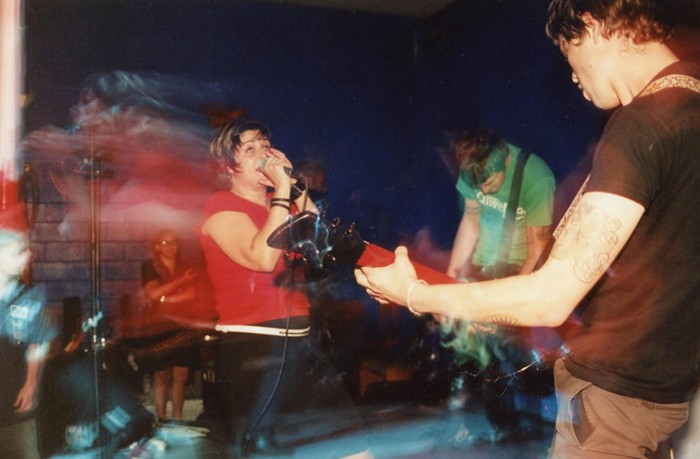
ANDREA ZOLLO: We played with Steve’s bands back in early, early, early Pretty Girls days. Maybe even our first tour. We just knew Steve as this punk we played with, who was always an awesome dude, but his dad, Rocky Aoki, started Benihana. When Steve went on tour with us once in Europe, he would take us to Benihanas around England because we could eat for free. It was wild to have people in the kitchen peek out and want to see Steve because he was Rocky’s son.
STEVE AOKI: I was there hawking T-shirts and selling the Dim Mak EP that honestly changed my life. I don’t remember the exact number, but I think it was at least 10,000 CDs sold. Mind you, I started Dim Mak with no distribution, strictly selling from my backpack of vinyl to fans coming to shows and then to small distribution networks. It would be a success if we sold out of 1,000 copies. This was the real start of being forced into becoming a business.
[Working with Pretty Girls Make Graves] taught me about how to follow my heart and friendships into the unknown with passion as my strongest suit out of the cards I was dealt. Derek and I later formed our own label called Cold Crush and released a few records, and that was also fun and out of our bond and friendship. I think back to those days with the band, and it brings a lump in my throat, thinking about the lovely memories of pure friendship and trust with no motives and gains.
Something Bigger, Something Brighter
When it came time for Pretty Girls Make Graves to release their debut full-length, Good Health, most folks in the know assumed the band would sign to Sub Pop. By that point, Derek’s former band Murder City Devils had released two full-lengths and an EP with the famous label, and Pretty Girls released their song “More Sweet Soul” through Sub Pop’s Singles Club.
But that’s not what happened. And the rumors were flying. Former Stranger music critic Kathleen Wilson reported in her column, It’s My Party (“Promotions & Departures,” February 14, 2002): “The Cha Cha was recently abuzz with chatter about a rumored legal war soon to be waged between the former Murder City Devils and Sub Pop. Details are sketchy, but it seems that Sub Pop feels the band still owes money following its breakup. Others say that the label is retaliating over its failure to procure (with its ‘leaving member clause’) Pretty Girls Make Graves, and is now trying to charge MCD for mechanical royalties, despite the fact that the band still sells nearly 100 CDs per week.”
Bay Area punk label Lookout! Records released Good Health on April 8, 2002.
ANDREA ZOLLO: Things got a little squirrelly. Sub Pop made us an offer, but Lookout!’s was better.
J. CLARK: I think Derek just wanted to try something different. Not to say he had anything bad with Sub Pop, but the whole band, for all of us, was about trying something different.
NICK DEWITT: I recall choosing Lookout! because we liked them as people right away, not corporate at all. Also, we really loved that Ted Leo and the Pharmacists record The Tyranny of Distance. I lived with J. at the time, and that record was on repeat for a couple months.
ANDREA ZOLLO: Before Derek moved to Seattle, he was living in the Bay Area. That was the music scene he hung around and crossed over into, around 924 Gilman Street. Our very first Pretty Girls tour was opening for Bratmobile, and, at that time, [Bratmobile’s drummer] Molly Neuman was one of the owners of Lookout!. It was actually Bratmobile and De Facto, which was Cedric [Bixler-Zavala] and Omar [Rodríguez-López] of At the Drive-In’s dub band.
I grew up listening to and being very, very influenced as a teenager by what was happening in Olympia and the entire riot grrrl scene, so the fact that we got to play with Bratmobile was not wasted on me as a twenty-something. I was excited every night. It was after that tour that Molly was like “Hey, let’s put something out!”
SPENCER MOODY: I remember telling Megan Jasper at Sub Pop, “Maybe Pretty Girls will get super huge, and that will bring attention to the Murder City Devils’ back catalog. Maybe we can just ride on their coattails [laughs].”
PHIL EK (Producer): I liked the fact that they were controlled chaos with a really, really super strong and tight rhythm section and energy-forward and exciting pop-melodic kind of punk vocals. It was a really cool blend of a lot of things that had happened, were current, and felt forward-reaching.
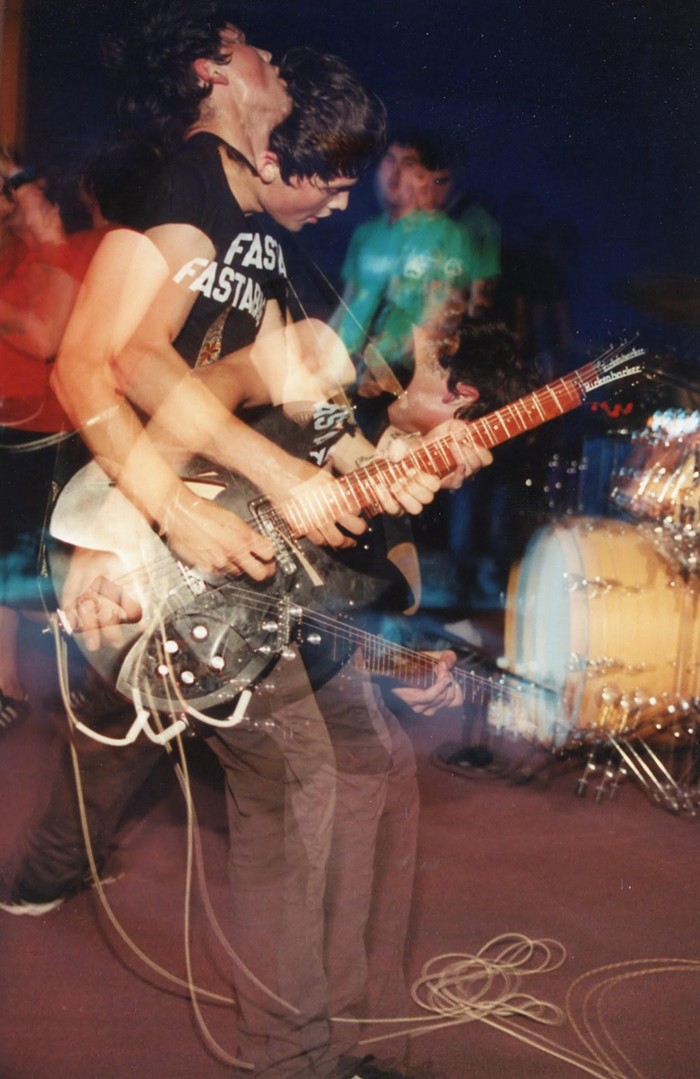
House after the release of Good Health. MEGAN SELING
LAURA JANE GRACE (Against Me!, Laura Jane Grace & the Mississippi Medicals): I remember the first time I heard Pretty Girls Make Graves very vividly. It’s like a moment in time for me. They played in Gainesville, Florida, at Market Street Pub, and I think it was the very first Fest in 2002. They played with Har Mar Superstar, and I had played some random house shows over the years with Har Mar, so I was there for that. I had no idea who they were; I had never heard their name. I remember Har Mar just killing it, but then when Pretty Girls Make Graves played, it was like time fucking froze. People started moving differently. The way the room felt—it was specifically “Speakers Push the Air,” and they came out guns blazing. It was like seeing the Clash or something. They were the coolest fucking band I had ever seen. Each of them looked impeccably cool too, and it sounded fucking great. From then on, I was totally sold.
STEVE AOKI: Live, they are each very different personalities onstage, all bold and animated in their own worlds, but really connected. They know each other’s movements—that’s where this X factor lies. The way they play their music together is the magic and the reason why their shows are so memorable. I’ve been with them from when they played to 20 people in a living room, to bigger shows for hundreds of people, and they pour sweat and energy into their show every time.
ANDREA ZOLLO: One show during our first US tour stands out just because it was bananas. It was at Mass Arts in Boston. We were all like “This is amazing!” even while it was happening because the crowd was so wild and having so much fun and dancing. This all-female mosh crew called Moshtrogen showed up. They all had T-shirts that said “Moshtrogen” with this great logo, and they started this giant mosh pit. There was someone in a dirty bunny costume. There were all these surreal things happening. I was so happy, I was so pumped—I’ll always remember Joan from Moshtrogen.
J. CLARK: After the first EP and Good Health, we were starting to get pigeonholed into a specific sort of emo/post-emo thing. Like the At the Drive-In thing, we would get that a lot. Don’t get me wrong, we played shows with those guys, and I love those guys, but that wasn’t musically where we were all coming from.
I was more an indie rock kid. Fugazi, Chavez, and Yo La Tengo were really huge influences on me. I wanted to be able to do something more diverse than what I did in the hardcore scene. I wanted to be able to express more than just fast and aggressive.

PHIL EK: We spent a month on [The New Romance] at Bear Creek. No days off either, which is insane. Good Health was a week, maybe. I wanted to make a record that felt more studio. Their Sub Pop single, their first EP, Good Health—those all feel live. It’s really just them performing their songs in the studio, and that sounds awesome. But I wanted to try different sounds, build textures. And they were stoked. Nick loves the studio. J. does tons of records now. They’re studio people. They like this stuff.
NICK DEWITT: We all love a lot of music, and at the time, I was making a lot of new discoveries. One week it’d be André Popp. Next week, it’d be Amon Düül II. Naturally, that meant trying out new styles and approaches.
PHIL EK: They were a very diplomatic band. Which is good! And also time-consuming. I have seen fistfights, I have broken up fistfights. I’ve seen people storm out. I’ve seen people quit in the studio. I’ve seen crying, I’ve seen yelling. They’re one of the few bands that really worked diplomatically well.
LAURA JANE GRACE: I’m not gonna lie. The changes they made as a band from record to record challenged me. It wasn’t a rehash of the previous record, ever. They grew really pronouncedly from album to album. Sometimes that took me aback, and I wasn’t necessarily sure if I liked where they were going, but I was always determined to keep listening, and I always got it eventually, and each record became a favorite.
Against Me! toured a lot with the Blood Brothers, and they were bands I associated with each other, coming from the Seattle scene. I looked at the Blood Brothers and Pretty Girls Make Graves as standards of cool.
When This Is Over, It’s All Right
In 2004, after guitarist Nathan Thelen left the band, Pretty Girls Make Graves brought in friend and former Hint Hint keyboardist Leona Marrs. Pretty Girls had always been a guitar-forward band—Thelen and Clark’s dueling riffs resulted in a delightfully dizzying maze of noise. Marrs had to go back through Pretty Girls’ catalog and write new keyboard-friendly parts. In a 2005 interview with Exclaim, Fudesco recognized the scope of the task, saying, “To put that kind of pressure on anybody is a little ridiculous.”
The band also toured constantly—they made multiple runs across North America and Europe and also hit Australia and Mexico. When it came time to go back into the studio in 2006 to record Élan Vital, all the bandmates were exhausted.
Élan Vital still received rave reviews, but a weaker 6.4 score from Pitchfork noted the band was “seeming to grow self-conscious and give into pressure to expand its horizons.” Their attempts at being diplomatic in the songwriting process muddied the waters, only adding to the already thick tension.
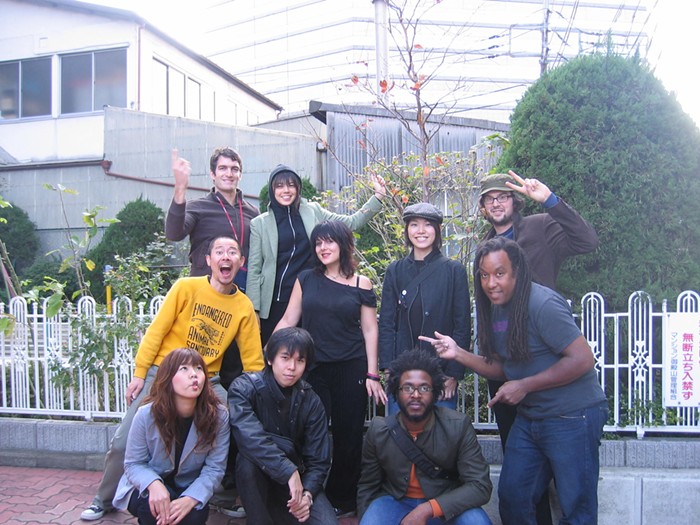
and the band’s “sixth member,” sound tech Julian Gibson. COURTESY OF ANDREA ZOLLO
J. CLARK: As the years went on, I think everyone’s taste broadened, so we started to try different things. By the time we got to Élan Vital, some people would bring in whole songs, and then we would maybe rework them. It was a slow development of people turning into songwriters. I mean, look at Derek and what he did with the Cave Singers after Pretty Girls. I think we were just trying to challenge ourselves.
ANDREA ZOLLO: I feel like there was a conscious intention with Élan Vital to let everybody have a voice because we never agree. We’re never on the same page. So if somebody wanted to write something in full, we let them do that and let them express themselves. I think that’s why that record sounds so different from the others. Like “The Number.” That’s Nick’s song; he wrote everything on that.
LEONA MARRS: For me, it was very exciting because I’d never been a part of a recording that had such a big budget. [Laughs] So we could really take our time. But we had challenges at that time, we came into [recording Élan Vital] not being very prepared. Because I was new, I wasn’t sure what was normal.
ANDREA ZOLLO: We definitely pushed ourselves too hard. Things were getting more and more tense.
LEONA MARRS: For most bands, I think, it often ends up [feeling] like a dysfunctional family. You just know each other so well, so you might not always get along. I got along with everyone because I didn’t have so much history. But I think there was some tension, and I think people were ready to move on. And I was too, actually. I was fine with it.
NICK DEWITT: I wanted to do my own thing. With hindsight, I see now that I could have done both. It was hard, of course. I sensed that when I left it would hurt our relationship, and for a time I’m sure it did.
ANDREA ZOLLO: We were all pretty surprised, though we shouldn’t have been. I think it was pretty bittersweet. I don’t think any of us wanted to stop, but I think it’s telling that we didn’t just get a new drummer.
J. CLARK: I was bummed about it. I was mad at [Nick]. He wanted to focus on his own music, which I thought was always great and encouraged him to do, but I didn’t want the band to break up. I don’t think Derek and Andrea did either, but we didn’t want to be the band that was whittled down to one or two original members, and you don’t even recognize them anymore.
ANDREA ZOLLO: That band did sort of implode. Everyone else moved out of Seattle pretty quickly. Derek and I were the only people who stayed, and because it was kind of a gnarly breakup, we didn’t all stay in touch.
Do You Remember What the Music Meant?
Pretty Girls Make Graves—Zollo, Fudesco, Clark, Dewitt, and Marrs—had their first reunion rehearsal in late August in Los Angeles. It was the first time in years that the band had all been together in the same room. There were hugs and apologies, and the nerves quickly gave way to excitement as they started to play.
ANDREA ZOLLO: I had no idea what to expect. I’ve seen Leona over the years, and I’ve seen J. over the years, but all five of us together in a room at the same time was really surreal. I didn’t know if it would be bringing up old shit. But it was really great. It made me more excited than ever to actually play together.
J. CLARK: It was nerve-racking a little bit! Obviously, we hadn’t played the songs in a while, and we 100% hadn’t been in the same place in a while, but by the end of it, it felt better than even when we were a band, in all honesty. We had hugs, we had moments of apologies for things that happened during the duration of the band, and it was just a good revival to start out with.
NICK DEWITT: [There was] definitely a bit of anxiety leading up to playing together again. I was so happy to see everyone, and we ran through a few songs and surprised ourselves at how good they sounded. Second run, though, was like hand in glove.
LEONA MARRS: I remember Derek saying, “It’s not like the songs are 4/4.” Some of them are very complicated, mathy. It was funny because when we were rehearsing, in my mind, I was like “God, these songs are so fast [laughs].” I thought I might be the only one thinking that, but everyone concurred.
Everyone’s laughing at what they played in the past, like “Why did I play so much? Did I need this fill here?” Just the best of the old times, it was comical and fun.
ANDREA ZOLLO: It started to feel very normal, and then that started to feel surreal.
J. CLARK: I remember leaving [rehearsal], and I said to them, “Dude, I’m so excited that I’m gonna put in 120% now and make sure that these shows are gonna be awesome.” Everyone felt really encouraged by being back together.
ANDREA ZOLLO: [We don’t have any new music] in the works yet, but we’ve literally had only one practice together so far. [Laughs] But I wouldn’t rule it out, because if you had told me a couple of years ago that we’d be playing a reunion show, I wouldn’t have believed it. So who knows what can happen?
Pretty Girls Make Graves play the Showbox Friday, September 20 and Saturday, September 21.
